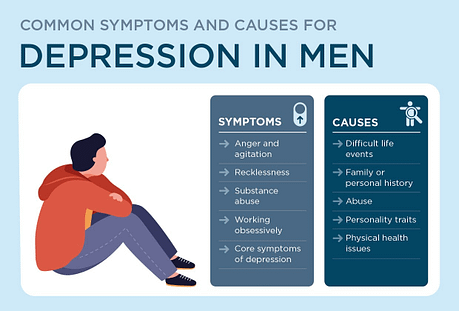Depression is a condition that affects both genders. However, for men, there is usually an added dimension of difficulty. Cultural expectations and traditional views on masculinity can make it difficult for men to admit, accept, and seek help for mental health struggles.
Depression in men sometimes looks very different from the models of what it looks like in women; instead of feelings of sadness or low mood, depressed men may become irritable, angry, or reckless. This can often be misconstrued and the mistaken belief reinforced that
“real men” should just tough it out. But therapy is a lifesaver, offering in important tools to manage depression and create a healthier life balance. Here’s why therapy should not be viewed as a burden but, rather, as support.
Understanding Depression in Men
For many men, they might not realize what they are going through is depression. It isn’t just feeling down; rather, it’s a complicated condition when all aspects of life take a beating. Some common symptoms of depression in men include:
1. Irritability and anger outbursts
2. Fatigue or low energy, even with adequate sleep
3. Loss of interest in hobbies or activities once enjoyed
4. Persistent feelings of sadness or emptiness,
5. Engaging in high-risk behaviors, such as reckless driving or substance abuse
6. Physical symptoms, including headaches or digestive problems
Minimizing these symptoms as stress or “just a rough patch” may deprive men of the help they need. Depression is more than a temporary mood swing; it is a medical condition that deserves-and requires-treatment.
Why Therapy Works for Men with Depression
Therapy is a confidential safe environment where the issues can be confronted with, especially those that one may find too overwhelming or uncomfortable to share elsewhere. Real support in therapy can be provided in the following way:
- Gaining Insight into Emotions
But above all, therapy helps men learn to recognize their emotions, especially those feelings that seem to be uncomfortable or alien. Most often, societal upbringing produces men who suppress or deny certain emotions and feelings-which can make it difficult to realize if they are suffering from depression. It provides a non-judgmental atmosphere to discuss such feelings and learn that they, too, are part of being human. - Learning Healthy Coping Mechanisms
Most men react by drinking, isolating themselves, or plunging into work as a way of escaping reality. A therapist will be able to help the men seek healthier ways through which they can express their feelings in more beneficial ways. Mindfulness, journaling, and constructive releasing of anger or frustration-all these are potent techniques that could be incredibly life-changing. - Nurturing Better Relationships
With time, depression may finally break up personal relations and either make men feel isolated or misunderstood. In fact, therapy does allow open communication that could reinforce relations not only with family but also with friends and partners. At such times, when men are able to share their struggles openly, they often find support from places that they never expected. - Challenge Limiting Beliefs About Masculinity
One of the reasons that keeps many men away from therapeutic intervention is the deeper belief that to seek help is to show weakness. Therapy will help men dismantle such beliefs and redefine strength as bravery toward openness and honesty in facing challenges. True resilience means understanding one’s vulnerabilities and working toward self-improvement with regard to mental health. - Long-term Wellness Strategies
Like many illnesses, depression can be a long-term condition. With therapy, men learn ways to take charge of managing their depression on the road ahead. Regular sessions andtechniques like exercise, mindfulness, or creative hobbies allow men to experience life without violent mood swings. - Therapy Is an Investment in Yourself
While some may regard therapy as a chore or an expense, it is actually an investment in well-
being. Improving mental health does not simply improve mood; it heightens the quality of life, productivity, relationships, and physical health altogether. Therapy helps provide tools that enable men to face up to depression valiantly and overcome it with resilience.

Finding the Right Therapist
Finding one that understands your particular experience can make all the difference. Many men find it helpful to seek out a therapist who specializes in male mental health or has experience addressing issues unique to men. Online therapy options can offer a comfortable alternative if face-to-face sessions feel intimidating.
Final Thoughts
Depression is not something a man should have to shoulder alone. Therapy provides real- world support and life-altering insight, helping men to thrive and live their lives with more balance. Whether it is you or somebody close to you who is battling depression, remember
that help is available, and asking for help is already a courageous move. To seek support is a sign of strength, a choice which will ultimately lead to a brighter and healthier future.





